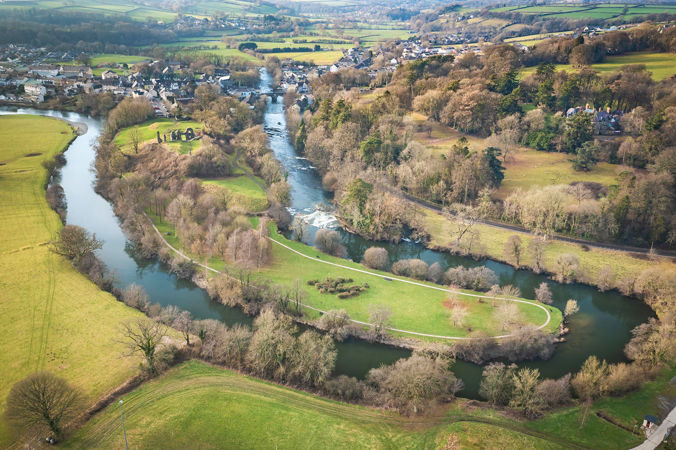Tackling the Teifi – landowners, industries and regulators join forces for pilot ‘demonstrator catchment’ project

The Afon Teifi is one of our nine Special Area of Conservation (SAC) Rivers in Wales, designated due to the rare species it supports, including lamprey, Atlantic salmon, otter and floating water-plantain.
It meanders 122km through three local authorities - Ceredigion, Carmarthenshire and Pembrokeshire - as well as through National Nature Reserves and Sites of Special Scientific Interest.
Like many of our other SAC rivers, sadly the Teifi is in an unfavourable condition, and in 2021 it was reported that it was exceeding acceptable water quality targets for phosphorus.
Recent research has indicated that salmonoid fish stocks are in rapid decline on the Teifi, with modelling predicting the species could be lost within the next ten years unless urgent action is taken.
Data suggests that discharges from wastewater treatment works are having a significant impact on the river, as well as diffuse pollution from agriculture and forestry activities, and pollution from the area’s legacy of metal mining.
Non-native invasive species such as Himalayan balsam, and historical modifications, such as weirs, are also impacting on the protected species for which the river is home.
Call to action
It is with these challenges in mind that we are collaborating with others on a project to tackle water quality issues on the Afon Teifi.
Last week NRW’s Chair, Sir David Henshaw, called together representatives from key organisations, industries and community sectors to seek a firm commitment. These included: Welsh Government, local authorities, farming unions, Dŵr Cymru Welsh Water, Afonydd Cymru, Keep Wales Tidy, the Consumer Council for Water and community campaigners Save the Teifi.
The initiative, which will be known as the ‘Teifi demonstrator catchment’ project, is one of the actions arising from the First Minister’s River Pollution Summit, which will reconvene later this week for the third time.
Its intention is to explore new and novel ways of working, and to seek innovative environmental solutions by working together with both public and private organisations, communities and third sector organisations.
As well as improving water quality, the project will also seek to improve the river’s resilience to climate change and enhance its biodiversity.
It will complement and support the good work already happening in the catchment, building on existing ambitious river restoration projects like our Four Rivers for LIFE project and the work of the Teifi Nutrient Management Board.
The ambition for the project is to develop a model which can be scaled up and replicated in other Welsh river catchments in the future.
Getting down to business

This initial stakeholder event was the first big step to kickstart the project and an important opportunity to review the work which is already underway, and which has been tried and tested previously.
During the meeting we discussed setting a clear set of objectives and a timeline to hold the project accountable.
We considered the challenges and pressures within the catchment, including the current SAC river planning constraints and how behaviour change will be key to success.
Monitoring came out as a strong theme, with the agreement that we need to have a clear baseline from which to monitor improvement over time. An action was taken to review current sources of monitoring data to identify gaps and where enhanced water quality monitoring may be required, and to consider how citizen science may be utilised to do this.
We discussed how we can add value to existing work programmes, and how the project presents an opportunity to be more experimental and innovative in our approaches, perhaps using NRWs own experimental power. The possibility of the project drawing down additional funding to develop and deliver these actions on the ground was also considered.
Lastly, we discussed the need to engage effectively with stakeholders including communicating clearly as our plans develop and progress during the life of the project. We appreciate and welcome the intensity of public feeling about our rivers and we wish to involve the local community in this project.
We had some great feedback from the event, including from the Save the Teifi Community group. They told us, “We believe that establishing the Teifi demonstrator project is a major step forward not just for the Teifi but for all the rivers in Wales. We look forward to working with stakeholders and other community groups to restore the river for the benefit of nature and society.”
Afonydd Cymru told us, “We very much welcome this joint initiative to restore the Teifi, a river that is in unfavourable condition and whose salmon and seat trout numbers are in worrying decline. We are looking forward to working with Natural Resources Wales and the other partners to ensure the urgent delivery of actions that are required to improve this important Welsh river.”
Next steps
In the coming months, we will continue to collaborate with partners and stakeholders agreeing clear objectives for the project and to co-develop a work programme for joint delivery.
We do not underestimate the size of the challenge here, and we anticipate that the life of the project could span up to five years.
This initial step acknowledges the scale of change required to achieve significant, tangible and longstanding improvements to the Afon Teifi and its wildlife.
And while change may feel slow, the project comes at a critical time for our rivers. How we work together – as regulators, Government, landowners, businesses and communities – will be pivotal if we are to deliver the improvements in our rivers that we all seek.
